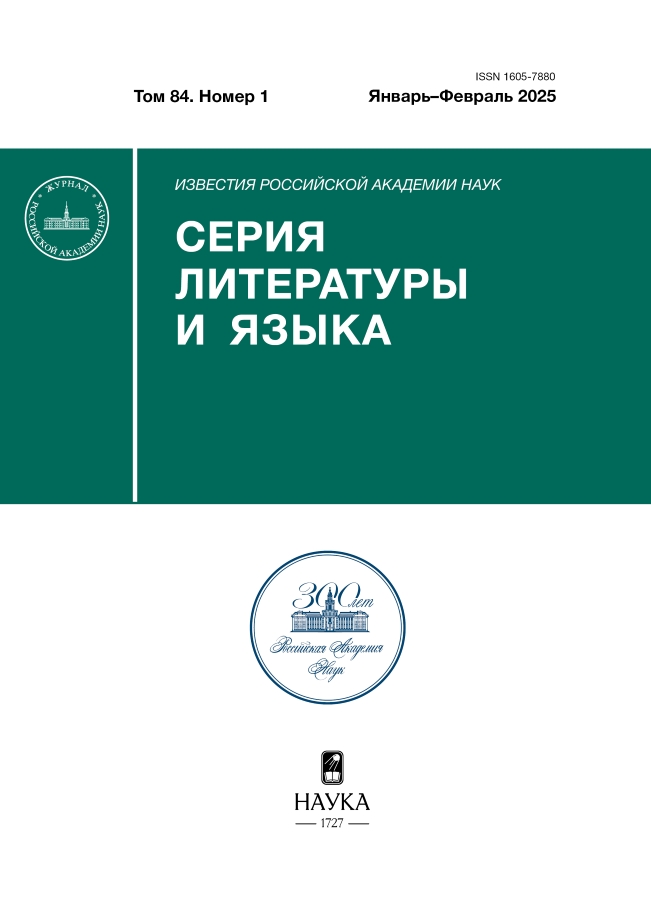“Dreams” by A. N. Maykov as the pretext of “The Dream of a ridiculous man” by F. M. Dostoevsky
- Autores: Krinitsyn А.B.1
-
Afiliações:
- Lomonosov Moscow State University
- Edição: Volume 84, Nº 1 (2025)
- Páginas: 33-43
- Seção: Articles
- URL: https://kazanmedjournal.ru/1605-7880/article/view/679055
- DOI: https://doi.org/10.31857/S1605788025010031
- ID: 679055
Citar
Texto integral
Resumo
The article analyzes in detail the problems of the poem by A.N. Maykov “Dreams”, taking into account the multiplicity of its interpretations and relying on the wide background of its literary and philosophical pretexts (Dante, Benyan, Pushkin). Separately, allusions in the poem to Platoʼs “State” are revealed and the influence of Platoʼs ideas on Maykovʼs historiosophy is traced. In the second part of the work, it is substantiated that the poem “Dreams” was one of the most important sources for Dostoevsky when he wrote the fantastic story “The Dream of a Ridiculous Man”, based on the common imagery and problematics in both works: in both cases, at the moment of a spiritual crisis, the hero has a fantastic dream in which he is shown the stages of the spiritual development of mankind, from the state of paradise to the fallen. Spiritual discoveries made in dreams lead both times to the spiritual resurrection of the hero, explain to him the fate of the world and the truth of life. When comparing Maykovʼs Dreams and The Dream of a Ridiculous Man, the question of the possible influence of Platoʼs ideas on Dostoevsky also arises. Gloomy, cold St. Petersburg, in which the “ridiculous man” languishes, in its ideological and artistic significance is likened to Plato’s cave, where only a reflection of the true light and only shadows from the omnipotent eternal sun, which for Plato and Dostoevsky both means God.
Texto integral
Sobre autores
А. Krinitsyn
Lomonosov Moscow State University
Autor responsável pela correspondência
Email: derselbe@list.ru
ORCID ID: 0000-0003-0262-5058
Doct. Sci. (Philol.), Professor at the Faculty of Philology
Rússia, 1 Bld. 51 Leninskie Gory, Moscow, 119991Bibliografia
- Merezhkovskiy, D.S. A.N. Majkov [A.N. Majkov]. Filosofskie techeniya russkoj poezii [Philosophical Currents of Russian Poetry]. St. Petersburg, 1896, pp. 317–335. (In Russ.)
- Zubkov, M.N. Russkaya poema serediny XIX veka [Russian Poem of the Middle of the 19th Century]. Moscow: Prosveshcheniye Publ., 1967. 216 p. (In Russ.)
- Maykov, A.N. Izbrannye proizvedeniya [Selected Works]. Compiled, prepared. text and notes L.S. Geiro; entry article by F.Ya. Priyma. Leningrad: Sovetskij pisatel Publ., 1977. 910 p. (In Russ.)
- Sokolov, A.N. Lermontov i russkaya romanticheskaya poema [Lermontov and the Russian Romantic Poem]. Uchenyje zapiski MOPI [Scientific Notes of MOPI]. 1949, Vol. 13, Issue 1, pp. 86–128. (In Russ.)
- Lyapina, L.E. Italyanskie vpechatleniya A. Maykova [Italian Impressions of A. Maykov]. Zhanrovo-stilevoe vzaimodejstvie liriki i eposa v russkoj literature XVIII–XIX vv. [Genre-Style Interaction of Lyrics and Epic in Russian Literature of the 18th–19th Centuries]. Moscow: MOPI Publ., 1986, pp. 124–140. (In Russ.)
- Dostoyevsky, F.M. Polnoye sobraniye sochinenij v 30 t. [Complete Works in 30 Vols.]. Leningrad: Nauka Publ., 1972–1990. (In Russ.)
- Plato. Gosudarstvo [The State]. Transl. by A.N. Egunov. Plato. Sochineniya v 4 t. [Works in 4 Vols]. Vol. 3. Part 1. Under the general editorship of A.F. Losev and V.F. Asmus. St. Petersburg: Publishing House of St. Petersburg University, Publishing house of Oleg Abyshko, 2007, pp. 97–494. (In Russ.)
- Buranok, N.A. Literaturnaya pozitsiya A.N. Maykova v seredine XIX veka [Literary Position of A.N. Maykov in the Middle of the 19th Century]. Aktualnye voprosy izucheniya i prepodavaniya russkoj literatury v vuze i shkole [Topical Issues of Studying and Teaching Russian Literature at the University and School]. Yaroslavl, 2004, pp. 44–46. (In Russ.)
- Neychev, N. Tainstvennaya poetika F.M. Dostoevskogo [Mysterious Poetics of F.M. Dostoevsky]. Ekaterinburg: Ural University Publ., 2010. 314 p. (In Russ.)
- Foyer-Miller, R. “Son smeshnogo cheloveka” Dostoevskogo: Popytka opredeleniya zhanra [Dostoevskyʼs Dream of a Ridiculous Man: An Attempt to Define a Genre]. Dostoevskij i mirovaya kultura [Dostoevsky and World Culture: an Almanac]. St. Petersburg, Moscow, 2004, No. 20, pp. 148–169. (In Russ.)
- Stepanyan, K.A. Ideal u Dostoevskogo i Shekspira [Ideal in Dostoevsky and Shakespeare]. Stepanyan K.A. Shekspir, Bahtin i Dostoevskij: geroi i avtory v bolshom vremeni [Shakespeare, Bakhtin and Dostoevsky: Heroes and Authors in Big Time]. Moscow: Global Kom; Yazyki slavyanskoj kultury Publ., 2016, pp. 226–260. (In Russ.)
- Kasatkina, T.A. Kratkaya polnaya istoriya chelovechestva: (“Son smeshnogo cheloveka” F.M. Dostoevskogo) [A Brief Complete History of Humanity: (“The Dream of a Ridiculous Man” by F.M. Dostoevsky)]. Dostoevskiy i mirovaya kultura [Dostoevsky and World Culture: an Almanac]. St. Petersburg, 1993, No. 1, Part 1, pp. 48–69. (In Russ.)
- Dudkin, V.V. Dostoevskiy i Platon [Dostoevsky and Plato]. Dostoevskiy i antichnost [Dostoevsky and Antiquity]. St. Petersburg: RHGA Publ., 2021, pp. 206–213. (In Russ.)
- Garicheva, E.А. Dialogicheskaya model mira v rasskaze F.M. Dostoevskogo “Son smeshnogo cheloveka” [Dialogical Model of the World in F. M. Dostoevsky’s Story “The Dream of a Ridiculous Man”]. Dostoevskij i sovremennost. Materials of the XVII International Readings in Staraya Russa 2002 [Dostoevsky and Modernity: Materials of the 17th International Readings in Staraya Russa in 2002]. Velikiy Novgorod, 2003, pp. 28–33. (In Russ.)
Arquivos suplementares










